
Report #2: Service Needs
A Survey of Individuals and Families Living with Autism
About the Autism Needs Assessment
The Bureau of Autism Services, in its effort to improve care and quality of life for Pennsylvanians with autism and their families, conducted the PA Autism Needs Assessment. This effort has been a key task of the ASERT (Autism Services, Education, Resources and Training) Collaborative and has been led by University of Pennsylvania School of Medicine, Center for Mental Health Policy and Services Research and the Center for Autism Research at The Children’s Hospital of Philadelphia.
Autism Spectrum Disorders (ASD), referred to as autism throughout these reports, include Autistic Disorder, PDD-NOS, Asperger’s Disorder, Childhood Disintegrative Disorder and Rett’s Disorder. With more than 3,500 responses, the survey is the largest of its type to date in the nation. The findings from this needs assessment highlight challenges that Pennsylvanians with autism, of all ages, face everyday.
This report is the second in a series. The recommendations in this report address service needs among Pennsylvanians living with autism.
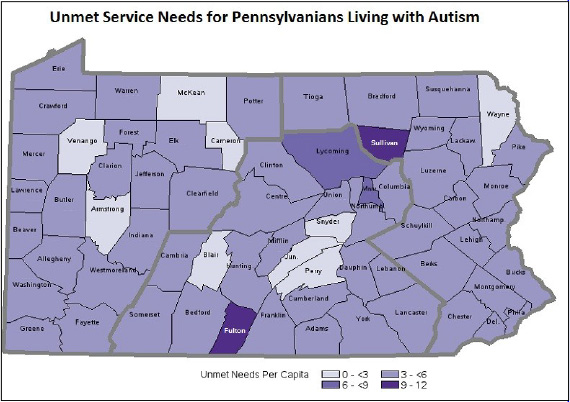
Why Look at Service Needs?
Individuals with autism and their families need a range of services to live as independently as possible, participate in their communities and enrich their quality of life. The map below illustrates that the needs of Pennsylvanians living with autism are not being met. This report looks at whether Pennsylvanians living with autism are getting the services they need, identifies barriers to accessing services, and examines if the families of individuals with autism consider the services they do receive to be effective.
- An unmet need for services occurs when an individual needs but does not receive a service or when an individual needs more of a service than he/she currently receives.
- Understanding which services individuals with autism and their families need is important in guiding changes to policy and practice. Understanding families’ satisfaction with services they receive will inform efforts to improve quality of services.
Please note that individuals of different ages were asked different questions. Visit www.paautism.org/asert to see the questions each age group was asked.
The report concludes with specific recommendations to address service needs among Pennsylvanians living with autism and their families across the lifespan.
Co-occurring Disorders
- 85% of individuals with autism have a co-occurring disorder, complicating the amount and type of services they need.
- Identifying physical and mental health professionals to deliver effective services is challenging due of lack of training, access, reimbursement or funding
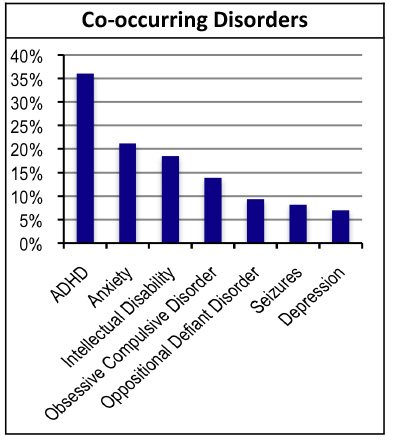
Mental & Emotional Health Services
Individuals with autism from every age group report that their needs for mental and emotional health services are not being met and that they are dissatisfied with many of the services they receive.
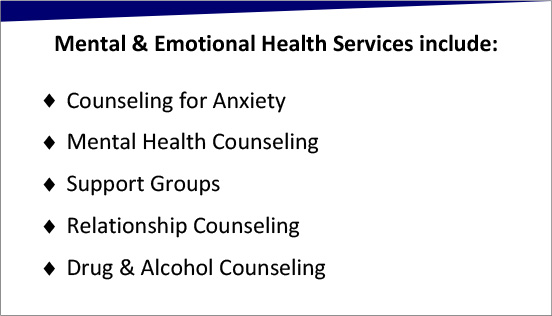
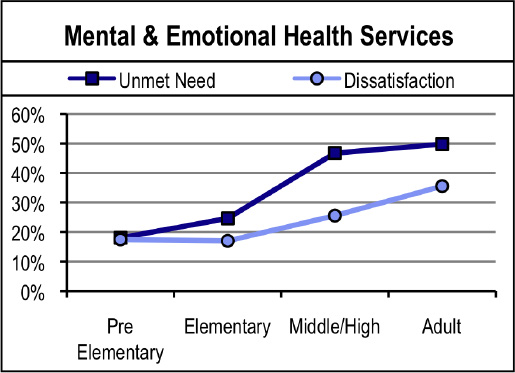
Unmet Need for Services
- Unmet need for mental health services substantially increases with age, because of both increasing need as individuals age and a lack of available services for adolescents and adults with autism.
- Almost half of all individuals in the middle/high school group and almost 3 in 5 adults have unmet mental health needs.
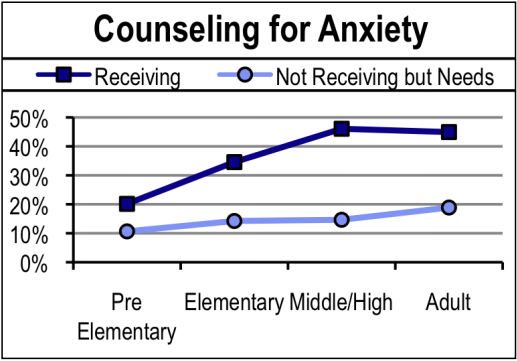
Counseling for Anxiety
- 45% of adults with autism receive services to address anxiety.
- An additional 20% of adults with autism report needing this service.
Satisfaction with Services
- Caregivers report the highest level of dissatisfaction with mental health counseling, out of all the mental and emotional health services surveyed. One in four report dissatisfaction with this service.
- Among all age groups, more than 1 in 5 feel the mental health counseling services they are receiving are ineffective. As individuals age into adulthood, this increases to more than 1 in 3.
- Lack of services, trained providers and research on effective delivery of mental health counseling services, especially for adults, may contribute to this high level of dissatisfaction.
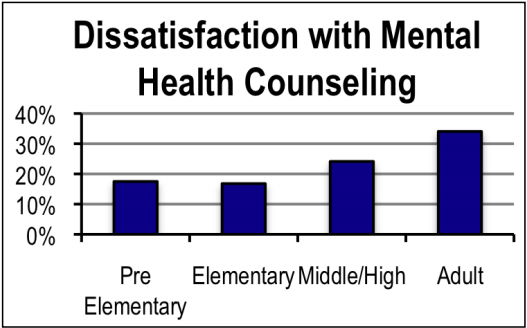
Physical Health & Functional Therapy
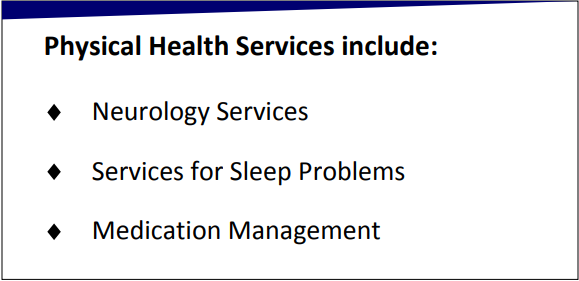
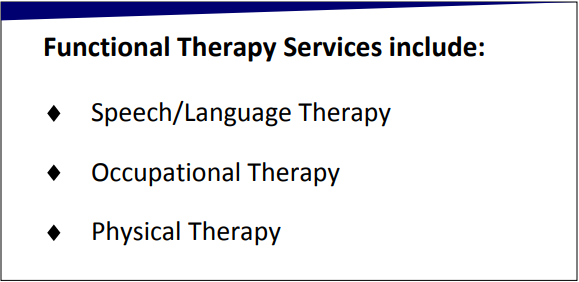
Unmet Need for Services
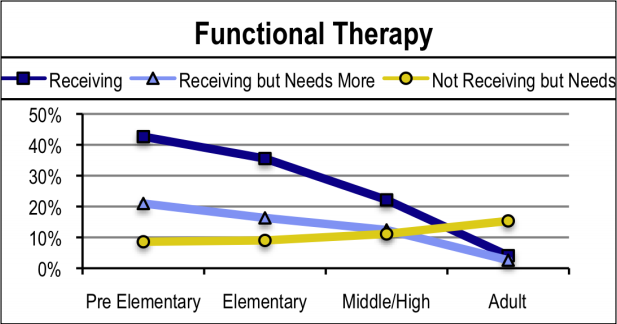
- More than 1 in 10 caregivers of individuals receiving functional therapy services report needing more of this service.
- As individuals age out of the education system, functional therapies are often no longer accessible, even though almost 1 in 4 caregivers of adults report that they need such services.
Physical Health & Functional Therapy, continued
- While specific physical health needs vary across individuals with autism based on their symptoms and cooccurring health conditions, there is often a consistent need for physical health and functional therapy services through the lifespan.
- Unmet need for medication management increases as individuals age, or because medication may be used to substitute for other services that are not available.
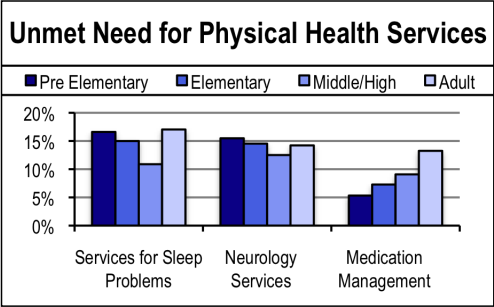
Satisfaction with Services
- As individuals age into adulthood, both unmet need and dissatisfaction with physical health services increase.
- Caregivers of adults most often report that physical health and functional therapy services are ineffective.
- Relatively low Medicaid payment rates may limit the number of provider options.
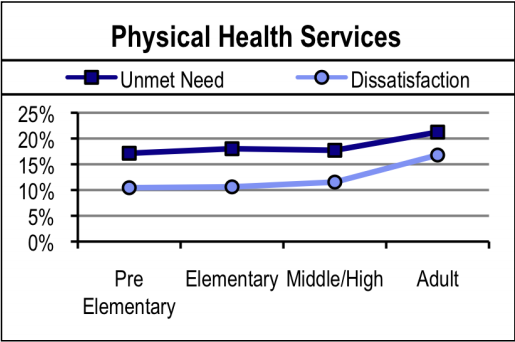
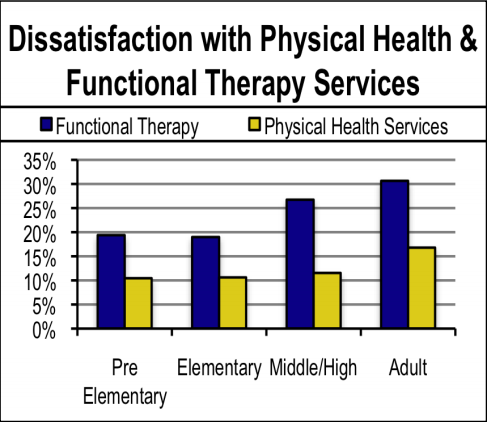
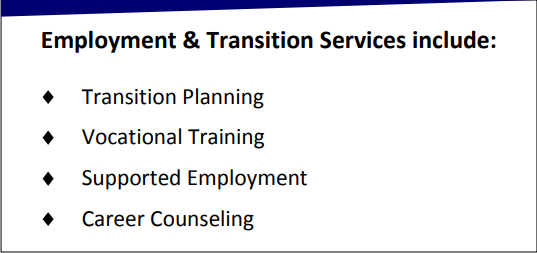
Employment & Transition Services
The survey asked only caregivers of middle and high school students, caregivers of adults and individuals who responded for themselves about Employment & Transition Services.
Unmet Need for Services
- The education system is responsible for preparing individuals with autism as they transition into adulthood to achieve the highest level of independence possible.
- Close to half of caregivers of students in middle and high school report an unmet need for transition services.
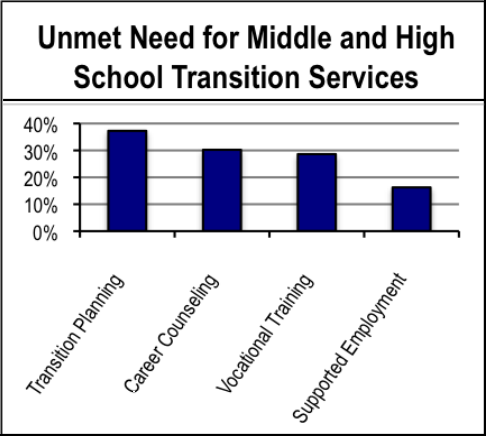
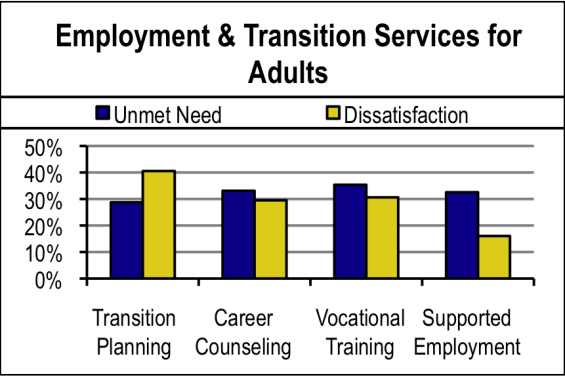
Satisfaction with Services
- According to parents, transition services do not effectively support the needs of individuals with autism. Almost 30% of caregivers of middle and high school students do not find transition planning, vocational planning or career counseling services effective.
- 1 in 3 adults report needing more transition services.
- Caregivers of individuals with autism report increasing dissatisfaction with transition services as their family member ages through the education system.
- More than 40% of caregivers of adults with autism are dissatisfied with transitional planning.
- Almost 1 in 3 adults are dissatisfied with vocational training and career counseling.
Satisfaction with Services
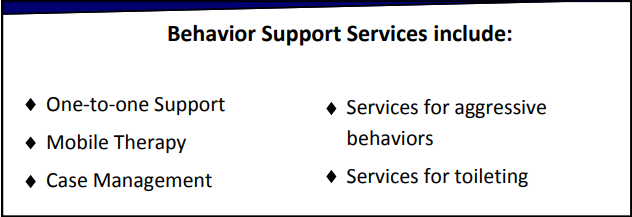
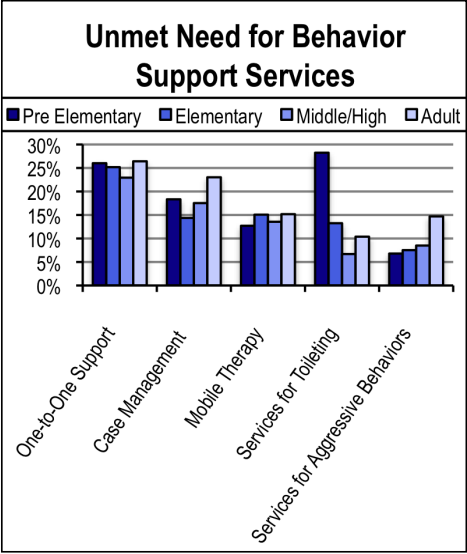
Unmet Need for Services
- 38% of adults with autism report an unmet need for mental and behavioral health services. Behavioral Health Rehabilitation Services (BHRS or wraparound), which include one-to-one support, are not available for adults. Some adults may receive one-to-one services, such as counseling, through the mental health system.
- More than 1 in 4 young children with autism need services for toileting. 10% of school-aged children need services for toileting.
- Unmet need for services for aggressive behaviors nearly doubles as individuals with autism age into adulthood (15%)
Satisfaction with Services & Skills of Professionals
- Caregivers’ dissatisfaction with behavior support services significantly increases with the age of their child.
- 25%-30% of caregivers of adults are dissatisfied with behavior support services.
- Adults in particular expressed dissatisfaction with skills of professionals providing behavior support services.
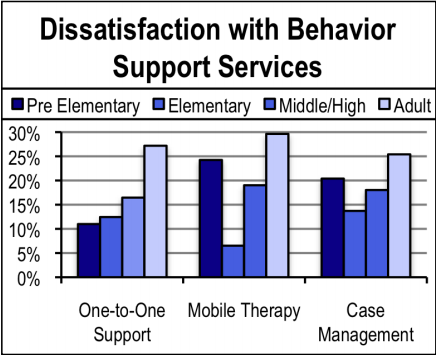
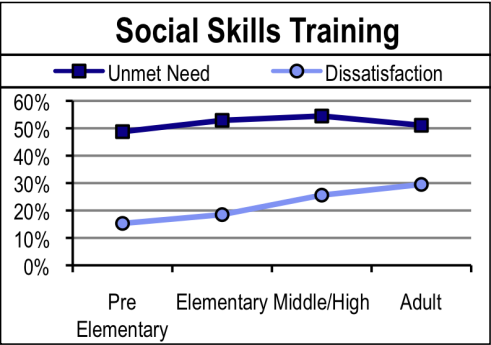
Social Skills Training
- Social skills training is among the most commonly reported unmet needs; among those using this service, as many as 1 in 3 caregivers are dissatisfied.
- More than half of caregivers of an individual with autism report an unmet need for social skills training for their family member.
- Dissatisfaction with social skills training increases with age. More than 1 in 4 caregivers of individuals in middle and high school report that social skills training is ineffective, and almost 1 in 3 caregivers of adults are similarly dissatisfied.
Sexual Health Education
- 1 in 6 caregivers report an unmet need for sexual health education, with the need being greatest for the middle/high school group.
- Caregivers of elementary school-aged children (24%) and adults (41%) are most dissatisfied with sexual health education services they receive.
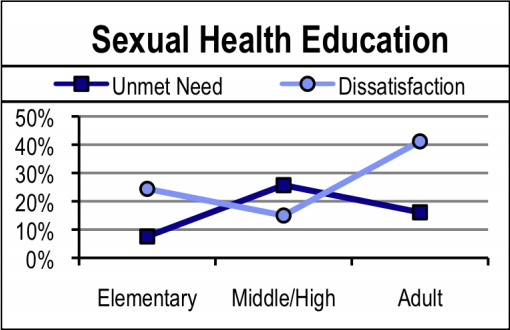
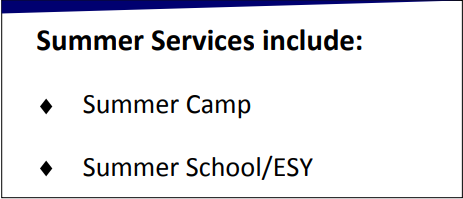
Summer Services
Continuous academic support services throughout the summer are important for individuals with autism. Year-long programs help individuals with autism generalize and maintain the skills they gained during the school year and are important to long-term gains.
Summer Services
- Almost 1 in 3 caregivers report an unmet need for summer services. There are few camps and summer activities that exist or are accessible that specifically support individuals with autism.
- Dissatisfaction with summer services ranges from 18% to 24% with caregivers of middle/high school students expressing the highest dissatisfaction, possibly due in part to the general lack of summer camp options for older children and young adults.
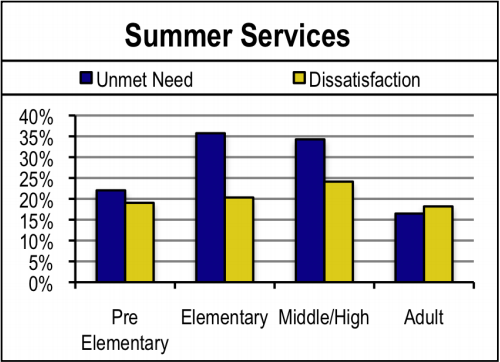
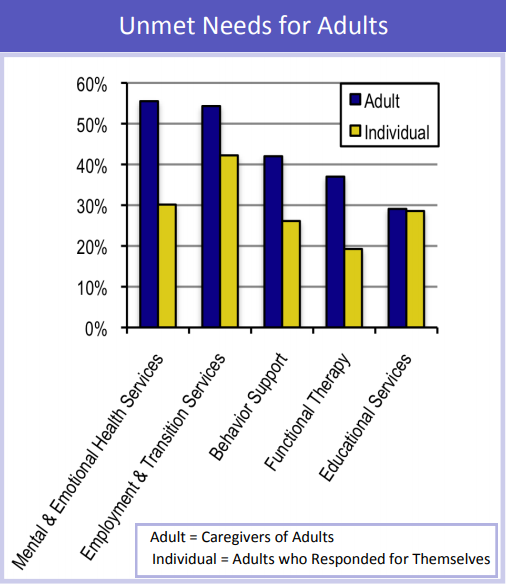
Adults at a Glance
- Almost half of adults faced barriers to receiving primary care or dental services.
- A greater proportion of adults with autism need services for aggression and self-injurious behaviors (20%) than children and adolescents with autism (10%-13%).
- More than 50% of adults had an unmet need for mental health and employment services.
Recommendations
1. Increase the availability of all types of autism services to support individuals with autism.
Individuals with autism have an ongoing need for services to address the core deficits of autism and any cooccurring disabilities. They also need services that support participation in their communities. However, many individuals with autism and their families are struggling to find services and coordinate care. Consistently across age groups, around 1 in 3 caregivers report needing more services. Of particular concern is the high unmet need for social skills instruction, sexual health education and summer services. These services are often not available, nor are they funded through traditional service systems. By creating incentives, more providers could be encouraged to offer these services
2. Train and provide ongoing support for providers to meet the needs of individuals with autism.
Individuals with autism need regular preventive care. They also require, more than others, services through the mental health care system. This survey shows that these services are not available because primary and mental health care systems have difficulty addressing the challenging behaviors that may accompany autism. Providers need autism specific training that fits within current continuing education models. Providers who serve more rural areas should receive training through consultation, telemedicine and distance learning.
3. Increase access to all types of services for adults with autism.
As individuals age out of existing services for children, including those provided by the school system, the availability of services diminishes greatly. Adults with autism and their families are desperate to find services and supports to meet their changing needs. As service providers expand their programs to include adults with autism, they should consult with experienced professionals who can assist in their efforts. The experience that providers within the Adult Autism Waiver and the Adult Community Autism Program (ACAP) are gaining should inform best practices in all systems where adults with autism are being served.
4. Increase satisfaction with services by implementing best practices.
Among those who are receiving services, a large proportion are dissatisfied. Training and consultation on best practices will enhance the quality and effectiveness of services individuals with autism receive. Reimbursement for these services should require the use of best practices when available and measure improved outcomes and satisfaction.
